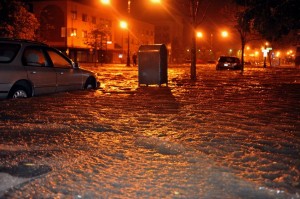Inconvenient Truths and Nuisance Flooding: How We Talk about Climate Change

“Global warming.” “Climate change.” Whatever you call the dramatic shifts in temperature currently affecting our planet, the vast majority of the world’s scientists agree that the shifts are real and pose an urgent threat to our stability and survival. So when the Miami Herald reported that Florida Governor Rick Scott’s administration had warned officials at the Florida Department of Environmental Protection (DEP) not to use the terms “global warming,” “climate change,” or “sea-level rising” in any reports, emails, or other communications, there was an understandable uproar.
Florida is particularly vulnerable to the effects of climate change. Erratic weather patterns and increased flooding are already damaging people’s homes, destroying roads, eroding beaches, and harming coral reefs. Scott’s administration has attempted to mitigate some of these negative effects by investing in sewage systems and beach restoration, but to truly protect the state and its people, government officials need to also address the underlying causes of global warming, especially the ways in which human beings are causing climate change through the burning of fossil fuels and increased carbon emissions. When presented with these facts, Scott has dismissed them by saying, “I’m not a scientist.” In gubernatorial debates he even used discussions of climate change to redirect the conversation to his faith in God and to pander to the religious right.
If Scott is willing to admit he’s not a scientist, then he should be more open to listening to what scientists at the DEP tell him. Instead, his administration encouraged DEP officials to use terms such as “climate-drivers” and “climate-driven changes” instead of “climate change” or “global warming.” The term “sea-level rising” was also swapped out for “nuisance flooding.” This incident is hardly the first time in which politicians have attempted to suppress the truth about our changing environment in order to pacify big business interests and appease fundamentalist Christians. Back in 2005, George W. Bush’s administration attempted to muddle the communications efforts of the US Climate Change Science Program. Since then, the evidence supporting climate change and linking it to human activity has only gotten stronger and more certain. Yet the American public is still confused about global warming and its causes. A 2014 study conducted by Yale University and George Mason University reported that 33 percent of American voters don’t believe that global warming is happening at all, while 49 percent believe that it is happening but is unrelated to human activity.
This confusion can, at least partly, be explained by the words we use to talk about the ways that we are altering our environment through our use of unsustainable energy sources. Words and phrases evoke different emotions and suggest varying levels of urgency related to the ecological problems we are currently facing. Another 2014 study by Yale found that the phrase “global warming” increased public understanding and emotional engagement with these problems. The phrase “climate change,” while often preferred by scientists for its accuracy, did not receive as strong a response from the general public. The terms used by Gov. Scott’s administration, such as “climate-driven changes” and “nuisance flooding,” also seem unlikely to illicit a passionate reaction from the public. ”Climate-driven changes” suggests that the cause for climate change has nothing to do with human behavior, and “nuisance flooding” makes the serious, global issue of rising sea levels sound like a minor inconvenience. Encouraging people to think seriously about climate change or to dismiss it as trivial is as much about the words we use as it is about presenting sound data and facts.
The facts are that global warming is real and that its ramifications for our society are vast and far-reaching. We’re already seeing increases in heat wave-related deaths and food- and water-borne illnesses in the United States, and unless we take action, these problems will only get worse. Flooding and drought are also contributing to food insecurity around the world, exacerbating economic instability and the gap between the rich and poor, and island nations across the globe are under threat of being wiped out completely. Humanists cannot let climate change deniers like Gov. Scott and his administration have the last word on the issue of global warming. The survival of our planet depends upon our having an understanding of this grave environmental problem. Unless scientists can communicate openly and honestly with the public, the information surrounding climate change will continue to muddle the facts with fiction and discourage people from taking real action.
